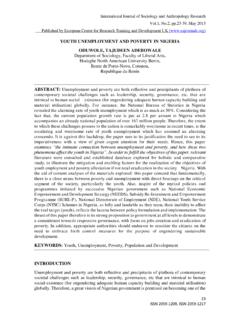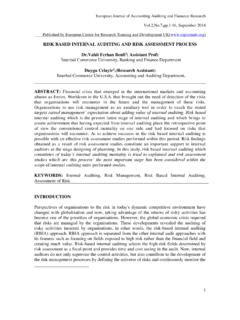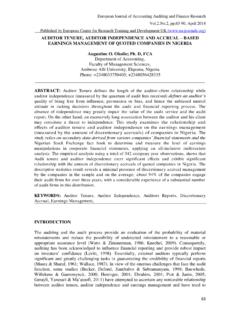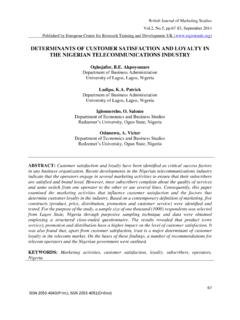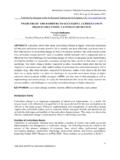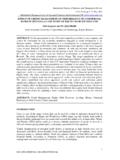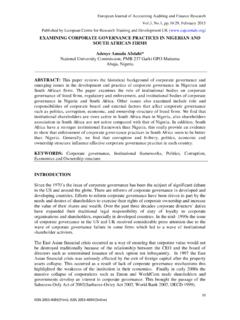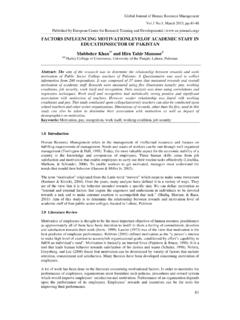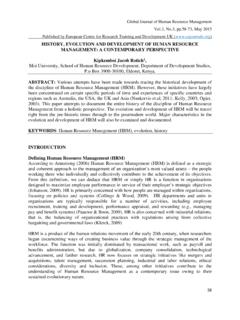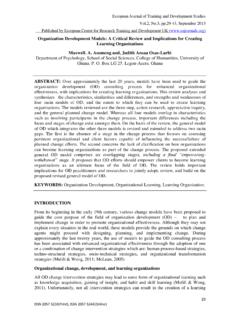Transcription of ENTREPRENEURIAL COMPETENCIES: A REQUIRED SKILL FOR ...
1 European Journal of Business and innovation research , 50-61, May 2020 Published by ECRTD-UK Print ISSN: 2053-4019(Print), Online ISSN: 2053-4027(Online) 50 ENTREPRENEURIAL COMPETENCIES: A REQUIRED SKILL FOR BUSINESS PERFORMANCE Pepple , Grace Jamie Department of Business Management, Faculty of Management Sciences University of Calabar, Calabar, Nigeria Enuoh, Rebecca Oliver Department of Business Management, Faculty of Management Sciences University of Calabar, Calabar, Nigeria ABSTRACT: The competitive nature of our business environment requires innovativeness and creativity to achieve performance. Being innovative and creative is important but being competent is very vital for any business growth. These can be achieved through training, learning new skills, attitudes, personal relationships, being initiative, information seeking and the rest to achieve ENTREPRENEURIAL objectives.
2 The paper therefore examines the competencies REQUIRED for ENTREPRENEURIAL performance, as influenced by personal traits and leadership skills. The paper adopted a theoretical approach and reviewed the relevant literature as a basis for the examination of ENTREPRENEURIAL competencies and performance. Finding shows that engaging in ENTREPRENEURIAL core competencies, personal traits and learners skills are positively related to business success. Engaging in managerial role, entrepreneurs require organizing and relationship competencies which are positively related to business success. The study recommended that government should be devoted to allocating resources for training and education. Entrepreneurs should desire entrepreneurship training and be more proactive. The study concluded that though ENTREPRENEURIAL competencies are learnable through ENTREPRENEURIAL training programmes and education they also serve as yardstick for formulating appropriate strategies and which when implemented enhance the attainment of business goals.
3 KEYWORDS: ENTREPRENEURIAL competencies, SKILL , business, performance Background to the study In a competitive business environment, the entrepreneurs are expected to have the requisite competencies such as attitudinal, intellectual, behavioral and managerial to be able to create business value in today s economy. Entrepreneurs are agents of economic change. A competent entrepreneur must have specific knowledge of the business, play social roles and remain skillful, creative, passionate, motivative, optimistic, persuasive, flexible, resourceful, assume risk, excellent planner, problem solver and the rest. ENTREPRENEURIAL competence can be learnable and possible to change through intervention such as selection and teaching of entrepreneurship (Man et al., 2008). The nature of ENTREPRENEURIAL competencies is important for improving entrepreneurship. Previous studies have attempted to categorize ENTREPRENEURIAL characteristics and competencies.
4 Huck and McEwen (1991) found that most vital competency areas for Jamaican entrepreneurs are planning, budgeting and marketing. Whereas, Chandler and European Journal of Business and innovation research , 50-61, May 2020 Published by ECRTD-UK Print ISSN: 2053-4019(Print), Online ISSN: 2053-4027(Online) 51 Jansen (1992) emphasized that the capability to identify and forecast, taking advantage of opportunities to see firms creation through to end are very important. By viewing the real behavior of an entrepreneur, the characteristics of ENTREPRENEURIAL competencies can be investigated from process perspectives. Man et al. (2008) defined the entire capability of the entrepreneur to execute the job role fruitfully as the ENTREPRENEURIAL competency and their work. The authors identified six major competency areas as: opportunity, organizing, strategic, relationship, commitment and conceptual competencies.
5 We exploit this categorization of ENTREPRENEURIAL competencies for current study because of its comprehensiveness. The ENTREPRENEURIAL personal traits and learners SKILL , if carefully followed can produce outstanding performance and maximize profit in the business. According to Man et al. (2008) relationship competencies speak about interactions, , co-operation with environment, using relations, persuasive ability, communication and interpersonal SKILL . As described by Bird (1995) the relationship building is considered as ENTREPRENEURIAL bonding, which comprises relationship making and reforming. Having strong competency in committing, determining and taking positive actions towards their responsibilities and tasks are important characteristics of successful entrepreneurs and which according to Chandler & Jansen (1992), constitute the ENTREPRENEURIAL role that drive the firm to success.
6 This equivalent to the ENTREPRENEURIAL role of driving to see end results of the firms (Chandler & Jansen, 1992). The environment is becoming ever more complex, entrepreneurs becoming more creative and innovative but without being competent the growth of any business will be truncated. Therefore, in order to diminish the negative consequence of the challenging business environment it is important that the entrepreneurs act proactively within the environment. ENTREPRENEURIAL competencies are becoming more important but some entrepreneurs are not creative, not risk takers, not passionate about what they do, not proactive and not available or willing to learn new skills either because of lack of knowledge, or lack of information. This can only be achieved when the owners of the business themselves try as much as they can to be innovative, risk takers, passionate, dutiful, and ready to learn new skills that will make them competent.
7 Entrepreneurs are challenged to step up their competencies in order to succeed in ENTREPRENEURIAL actions (Brinckmann, 2008). A few studies have been conducted to identify the relationship between managerial or ENTREPRENEURIAL competencies and performance of the firm ( Chandler & Jansen, 1992; Chandler & Hanks, 1994; Man et al., 2008). Rarely has any empirical study examined the link between ENTREPRENEURIAL competencies as it involves the intersection of personal traits and learners skills. This is the research gap this paper seeks to fill by examining the competencies REQUIRED for ENTREPRENEURIAL performance: the intersection of personal traits and learners skills. The main purpose of this study was to examine the competencies REQUIRED for ENTREPRENEURIAL performance: the intersection of personal traits and learners skills. Specifically, the study was carried out to: 1.
8 Evaluate the relationship between owners innovation skills and ENTREPRENEURIAL performance; European Journal of Business and innovation research , 50-61, May 2020 Published by ECRTD-UK Print ISSN: 2053-4019(Print), Online ISSN: 2053-4027(Online) 52 2. Investigate how business passion contribute to the performance of entrepreneurs; 3. Determine the contribution of risk-taking on the performance of ENTREPRENEURIAL ventures 4. Establish the relationship between personal trait, creativity and learners skills. THEORETICAL FRAMEWORK After a careful consideration of the various theories related to entrepreneurship and organization, the resource dependency theory was selected; hence it is the most suitable for the study. According to Pfeffer & Salancik (1978), Resource dependence theory is the study of how the external resources of organizations affect the behavior of the organization.
9 The procurement of external resources is an important tenet of both the strategic and tactical management of any company. Resource dependence theory has implications regarding the optimal divisional structure of organizations, recruitment of board members and employees, production strategies, contract structure, external organizational links, and many other aspects of organizational strategy. The theory was propounded by Mayer (1999). This theory introduces accessibility to resources. The theory points out that organization usually tend to reduce the uncertainty of external influence by ensuring that resources are available for their survival and development. This theory shows that the strength of any business depends in the information it has at its disposal. Resource dependency theory is vital here because entrepreneurs need information, training, educations and various skills to remain competent and add value to their businesses and this can only be achieved from the information gathered.
10 Empirical review Onwuchekwa, Ejike & Mgbemena (2017) carried out a study on The role of ENTREPRENEURIAL competencies in promoting entrepreneurship in Nigeria: A study of practicing entrepreneurs in Anambra State, Nigeria . The major findings are that ENTREPRENEURIAL failures in Nigeria should not be seen only in the area of inadequate access to financial resources, as the entrepreneur also needs to acquire competencies in the areas of time management, communication, marketing, decision making and financial management. In the light of the findings, it was recommended that the government should encourage the entrepreneurs to develop the identified competencies for effective performance in their business among other recommendations. Inyang & Enuoh (2006) carried out a study on ENTREPRENEURIAL Competencies: The Missing Links to Successful Entrepreneurship in Nigeria . The study identified that the missing links to successful entrepreneurship as ENTREPRENEURIAL competencies, defined as the cluster of related knowledge, attitudes, and skills which an entrepreneur must acquire or possess to enable him produce outstanding performance and maximize profit in the business.
